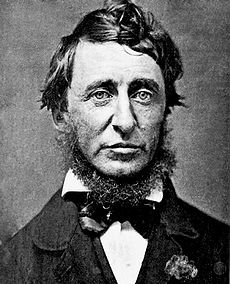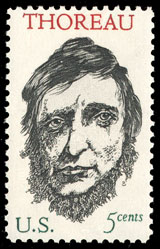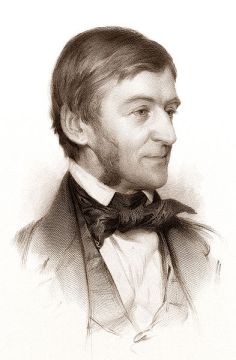Well, actually, I can. We stayed about an hour after they closed! It turns out that our new “Panaradise” closes at 8pm not 9pm. Whoops.
Before you get bored with my yammering and stop reading, what you need to know is that next month we will be meeting at Shelia’s house! Her address will be in the e-vite.
Confession: I totally forgot to take photos. #photographerfail
Instead, here are some of my favorite quotes from Nature:
“When we speak of nature in this manner, we have a distinct but most poetical sense in the mind. We mean the integrity of impression made by manifold natural objects. It is this which distinguishes the stick of timber of the wood-cutter, from the tree of the poet. The charming landscape which I saw this morning, is indubitably made up of some twenty or thirty farms. Miller owns this field, Locke that, and Manning the woodland beyond. But none of them owns the landscape. There is a property in the horizon which no man has but he whose eye can integrate all the parts, that is, the poet.” (emphasis mine. i read on my phone and have no page numbers, but it’s an essay for crying out loud. find the page yourself. :D)
“Nature, in its ministry to man, is not only the material, but is also the process and the result. All the parts incessantly work into each other’s hands for the profit of man. The wind sows the seed; the sun evaporates the sea; the wind blows the vapor to the field; the ice, on the other side of the planet, condenses rain on this; the rain feeds the plant; the plant feeds the animal; and thus the endless circulations of the divine charity nourish man.” (again, emphasis mine. he had a habit of using lots of illustrations and then wowing me with a really poetic point at the end of the paragraph. i felt like this read a lot like poetry, actually.)
“Willingly does she follow his steps with the rose and the violet, and bend her lines of grandeur and grace to the decoration of her darling child.” (i have no recollection of what he was talking about, but the visual is stunning.)
“good thoughts are no better than good dreams, unless they be executed!” (amen.)
“What noble emotions dilate the mortal as he enters into the counsels of the creation, and feels by knowledge the privilege to BE!” (here. here.)
“Nature is made to conspire with spirit to emancipate us. Certain mechanical changes, a small alteration in our local position apprizes us of a dualism. We are strangely affected by seeing the shore from a moving ship, from a balloon, or through the tints of an unusual sky. The least change in our point of view, gives the whole world a pictorial air. A man who seldom rides, needs only to get into a coach and traverse his own town, to turn the street into a puppet-show. The men, the women, – talking, running, bartering, fighting, – the earnest mechanic, the lounger, the beggar, the boys, the dogs, are unrealized at once, or, at least, wholly detached from all relation to the observer, and seen as apparent, not substantial beings. What new thoughts are suggested by seeing a face of country quite familiar, in the rapid movement of the rail-road car! Nay, the most wonted objects, (make a very slight change in the point of vision,) please us most. In a camera obscura, the butcher’s cart , and the figure of one of our own family amuse us. So a portrait of a well-known face gratifies us. Turn the eyes upside down, by looking at the landscape through your legs, and how agreeable is the picture, though you have seen it any time these twenty years!” (great photography advice. 10 points if you know what a camera obscura is without having to look it up :D)
“The true philosopher and the true poet are one, and a beauty, which is truth, and a truth, which is beauty, is the aim of both.” (i think this is actually the origin of the phrase, “beauty is truth, truth is beauty.” agree? disagree?)
“I have no hostility to nature, but a child’s love to it. I expand and live in the warm day like corn and melons.” (fantastic. my favorite quote. hilarious, too.)
“As a plant upon the earth, so a man rests upon the bosom of God; his is nourished by unfailing fountains, and draws, at his need, inexhaustible power. Who can set bounds to the possibilities of man? Once inhale the upper air, being admitted to behold the absolute natures of justice and truth, and we learn that man has access to the entire mind of the Creator, is himself the creator in the finite.” (basically he’s yammering on about nature poetically. i love it. if you don’t like nature or poetry, this might not be the essay for you.)
Walking by Thoreau:
I found so much truth and hilarity in this essay. Yes, it does just sound like an old man yammering on about how much he loves to take walks. BUT I LOVE TAKING WALKS. If you like walking or even the idea of walking, you might like this essay. I sort of went overboard on Emerson quotes, so I’ll spare you here.
Both essays are in the public domain I believe, so there’s no reason not to track them down if you’re intrigued!
Next month is a DEFINITELY going to be a winner. It’s The Hiding Place by Corrie Ten Boom. A memoir. Rachel says it’s her all-time favorite book. But you don’t have to take our word for it. (butterfly in the sky… i can go twice as high. you’re welcome.)


